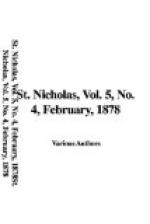Very naturally, it was impossible for our adventurer to obtain another English ship-of-war, although he received much credit for the courage and skill shown in controlling the mutineers, and one would conclude that the treasure of the old Spanish galleon would after this have remained at the bottom of the sea, the exclusive possession of the sharks, the turtles and the barracudas. But with rare pertinacity Phips returned to the charge, and at last persuaded the Duke of Albemarle and several other wealthy noblemen to his views. They formed a company and obtained a patent from King James II., giving them the sole right to all wrecked treasure they might find during a certain number of years. Then they fitted out a ship and tender, the latter to cruise in coves and shoal water, and Phips invented several rude contrivances, for dragging and diving, far inferior to the means now used for such purposes. Thus prepared, he sailed once more for Hispaniola. There a small, stout boat was built, and with it and a crew of Indian divers the tender was despatched to the reef where the wreck was said to be. The tender was anchored in good holding-ground at a safe distance from the reef, and the men then rowed slowly in the boat around it, carefully examining the depths below for signs of the wrecked galleon. The waters in the West Indies are very clear, and during a calm objects can be seen at a considerable depth. The rocks were of singular form, rising nearly to the surface, but with sides so steep that any vessel striking them would be liable to go down many fathoms below the reach of the most expert diver. The only hope was that the wreck might have lodged on some projecting ledge. But the closest observation, long continued, failed to reveal any sign of the object so eagerly sought, although the water was perfectly calm.
[Illustration: CAPTAIN PHIPS THREATENS TO SAIL AWAY FROM THE MUTINEERS.]
At length; a curious sea-plant cropping out of a crevice in the sides of the reef caught the eye of one of the crew, and he sent down an Indian to bring it up. When the diver returned to the surface he reported that he had seen a number of brass cannon lying tangled among the sea-weed on a ledge. That was enough. Inspired with the greatest enthusiasm, diver after diver plunged below to be the first to discover the treasure, and ere long one of them brought up an ingot of silver worth several hundred pounds. Transported with success they left a buoy to mark the spot, and made all sail to carry the glad tidings to Phips. He would not credit the tale until he had seen the ingot, when he exclaimed, “Thanks be to God, we are all made!”




